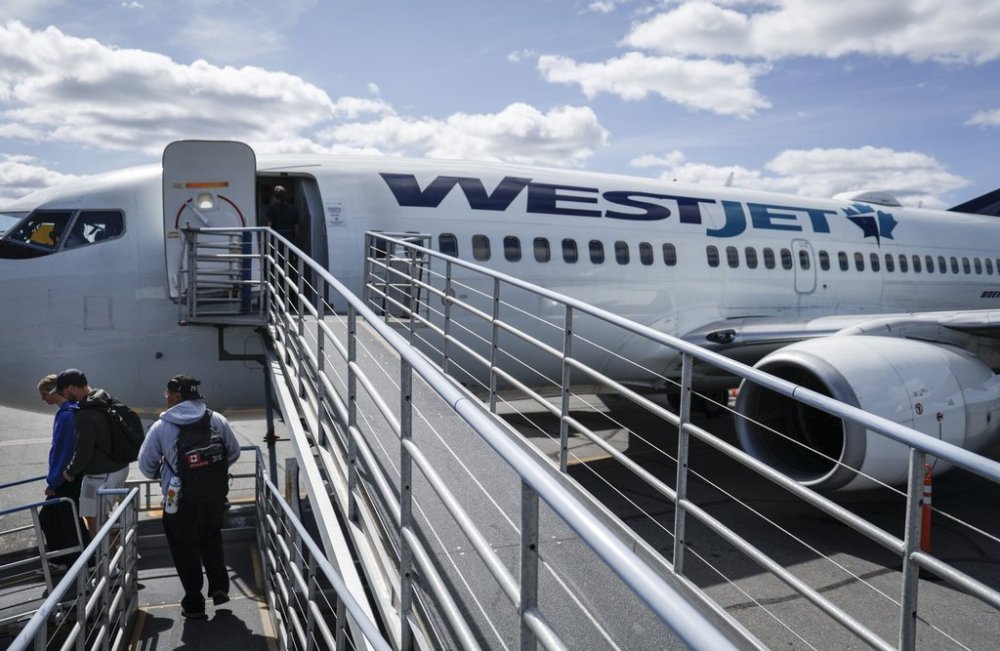WestJet weight cap on power wheelchairs leaves some Canadians grounded, advocates say
Advertisement
Read this article for free:
or
Already have an account? Log in here »
To continue reading, please subscribe:
Monthly Digital Subscription
$0 for the first 4 weeks*
- Enjoy unlimited reading on winnipegfreepress.com
- Read the E-Edition, our digital replica newspaper
- Access News Break, our award-winning app
- Play interactive puzzles
*No charge for 4 weeks then price increases to the regular rate of $19.00 plus GST every four weeks. Offer available to new and qualified returning subscribers only. Cancel any time.
Monthly Digital Subscription
$4.75/week*
- Enjoy unlimited reading on winnipegfreepress.com
- Read the E-Edition, our digital replica newspaper
- Access News Break, our award-winning app
- Play interactive puzzles
*Billed as $19 plus GST every four weeks. Cancel any time.
To continue reading, please subscribe:
Add Free Press access to your Brandon Sun subscription for only an additional
$1 for the first 4 weeks*
*Your next subscription payment will increase by $1.00 and you will be charged $16.99 plus GST for four weeks. After four weeks, your payment will increase to $23.99 plus GST every four weeks.
Read unlimited articles for free today:
or
Already have an account? Log in here »
MONTREAL – A rule at WestJet Airlines that bars some power wheelchairs from most of its planes discriminates against people living with a disability, say advocates and travellers.
The Calgary-based airline states on its website that mobility aids are capped at 300 pounds for the vast majority of its aircraft, a limit that rules out many power wheelchairs.
After flying with WestJet for years, Manitoba resident and former MP Steven Fletcher said an airline agent told him they would not be able to carry his wheelchair on a flight from Winnipeg to Toronto last February due to its weight.

“It is a deliberate corporate attempt to restrict through policy who can or cannot fly on their aircraft,” he said in an interview, calling the move “discriminatory” and “against common sense.”
Fletcher was forced to use a different wheelchair, causing pain and pressure sores that required medical attention, he said. “It has real-world effects.”
Recently, the parents of a 14-year-old girl from Saskatoon were told she could not fly to Mexico for her family’s trip because her wheelchair was too heavy. Her trip was denied despite the fact she had flown with WestJet from Saskatoon using the same mobility device before.
“Our team is working with the family to help with their upcoming travel,” WestJet spokeswoman Julia Brunet said in an email Monday when asked about the incident. The wheelchair was “significantly above” the airline’s new threshold, she said.
In a response to a regulatory complaint filed by Fletcher, the airline said accessibility regulations allow it to refuse transport of heavier mobility aids.
WestJet said it landed on the 300-pound limit last year after an engineering analysis, which examined the “maximum allowable weight limit per square inch for the cargo holds” of its Boeing-made planes.
“The engineering analysis considered the footprint and weight distribution for a power wheelchair being loaded upright,” the company wrote in a filing to the Canadian Transportation Agency.
All the jets in WestJet’s fleet are made by Boeing. All but six or seven of its 145 active jets are narrow-body planes, according to ch-aviation, an industry data provider. WestJet’s website says no wheelchairs over 300 pounds can be loaded onto those narrow-bodies — mainly Boeing 737s. Some of its handful of wide-body jets have the 300-pound limit as well.
No other North American airline maintains such a low cap for jets, said Maayan Ziv, founder of AccessNow, a Toronto-based platform that shares information about accessible places across the globe.
“It’s their responsibility to figure out how to support and accommodate all passengers, and something like an arbitrary rule about a 300-pound weight limit just demonstrates the level of ignorance or a blatant decision to discriminate against disabled people,” she claimed.
“The majority of people who travel with complex power wheelchairs are going to surpass that 300-pound weight limit.”
American Airlines imposed a similar ceiling in 2020 before quickly walking it back amid a backlash.
WestJet said in its regulatory submission that it has followed all laws and regulations.
“WestJet submits that it clearly complied with all of its obligations,” the company said in its filing.
This report by The Canadian Press was first published Nov. 18, 2025.

